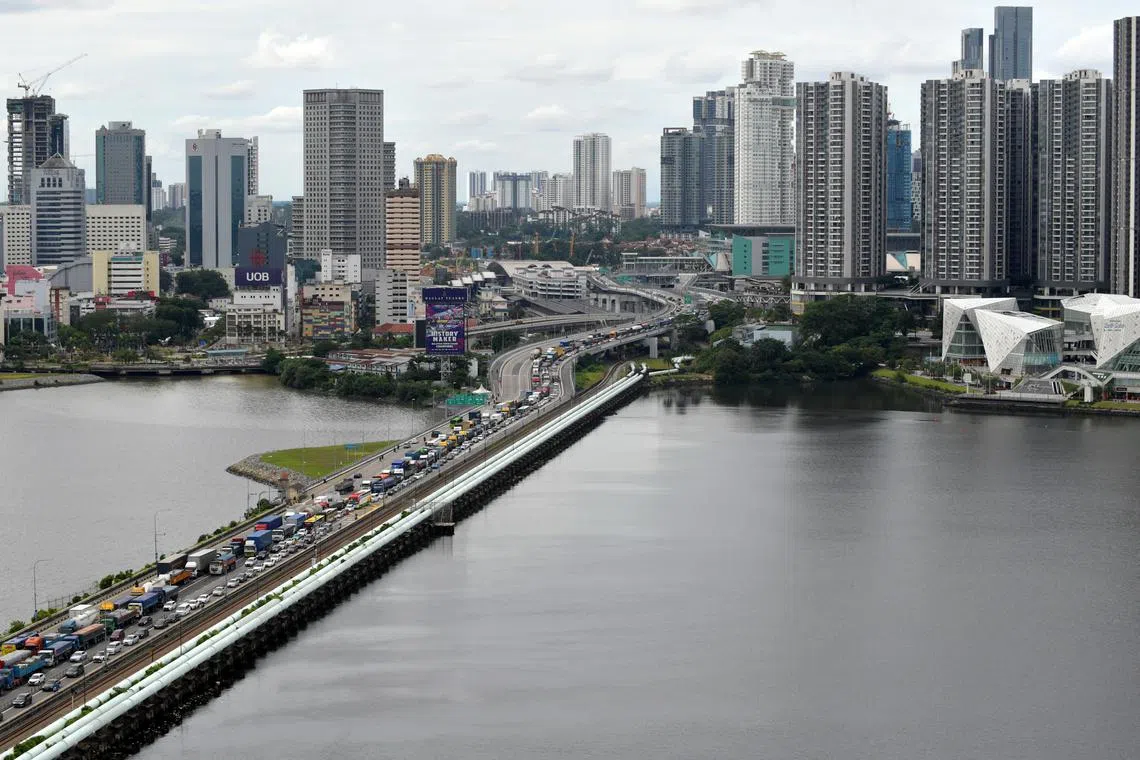Submitting advance passenger information to ICA could be challenging: Private bus operators
Sign up now: Get ST's newsletters delivered to your inbox

If passed, bus operators would need to submit passenger information before their vehicles reach the Woodlands and Tuas checkpoints.
ST PHOTO: ALPHONSUS CHERN
SINGAPORE – Bus operators with routes across the Causeway said a plan to submit advance passenger information
The proposed law is part of the Immigration (Amendment) Bill that was introduced for first reading in Parliament on Wednesday by Second Minister for Home Affairs Josephine Teo.
If passed, bus operators will need to submit passenger information before their vehicles reach the Woodlands and Tuas checkpoints. Public bus operators like SBS Transit and Causeway Link will be exempted.
The Ministry of Home Affairs said this advance screening of passengers could weed out undesirable travellers, such as those who pose a safety or security threat.
No-boarding directives (NBDs) are another plan proposed in the Bill. If passed, ICA could issue NBDs to transport operators to bar undesirable individuals from boarding, instead of these people being turned back only upon arrival in Singapore.
Operators who fail to comply may be fined.
Close to 100,000 people cross the Woodlands Checkpoint by bus daily, and the majority are Malaysian workers, said ICA in May this year. It did not provide specific breakdowns for public and private buses.
Mr Joshua Kiong, a sales manager at 707-Inc Great Excursion Travel, said: “We’ll have to stop accepting bookings four hours in advance so we have time to submit passengers’ details to ICA.
“We wouldn’t be able to allow boarding for last-minute passengers, so we’ll lose a lot of business.”
About 30 per cent of his company’s customers book tickets less than six hours before departure. Some also buy tickets in terminals in Malaysia for buses that leave within the hour.
“(With earlier cut-off times), if they arrive at 4pm, they wouldn’t be able to board a bus that leaves at 5pm. Instead, they might have to wait till 10pm,” said the 53-year-old, adding that his company has 25 buses crossing the border daily.
Mr Eugene Soh, 47, who owns Malaysian bus operator City Express, said it collects passenger information for 90 per cent of bookings, which are done online. The remaining bookings at bus terminal counters are not digitally recorded.
Mr Soh, who has been operating cross-border buses for over a decade, said: “For example, there are walk-in customers who buy tickets at 10am for a 10.30am bus... we’ll have to create a system that records their details too.”
A spokesman for bus operator Star Qistna said bus terminals can also send passenger information, but ICA would need to discuss with Malaysia’s terminal managements as some of them are “extremely outdated”.
An ASquare Travel vehicle coordinator who wished to be known only as Mr Lim, 25, said he heard rumours about the proposed law a few months ago.
He worries there could be more paperwork. If, say, there are vehicle breakdowns, he is not sure if operators also have to provide new vehicle information to the authorities.
Another challenge is getting passengers to provide accurate details, as some register under a different name for fear of their information being leaked, said Mr Kiong.
A 48-year-old manager at local bus operator Luxury Coach Service, who wanted to be known only as Mr Lee, said: “Some passengers are not cooperative in giving their information, with some citing the Personal Data Protection Act.”
This also poses problems for enforcing NBDs. Mr Kiong said: “These passengers might try their luck by using someone else’s identity to enter, and it’ll be difficult to verify this. We’re just bus operators, not ICA.”
He added that some passengers refuse to show their passports to bus operators. NBDs could also create conflicts, as travellers may demand to know the reason they cannot board, but operators may not have access to this information.
Mr Lee said: “If a passenger can’t board and makes noise, and the bus can’t leave, who is going to pay for my compensation?”
He added that the authorities would need to issue official letters for the NBD, or bus operators would face trouble explaining the situation to customers.
Mr Soh suggested the ICA inform passengers about whether they can enter Singapore when they fill in their SG Arrival Cards, as an alternative to operators enforcing an NBD.
All foreigners entering Singapore via the land checkpoints have to submit SG Arrival Cards online
Currently, ICA collects advance passenger information from airlines and ships. NBDs, however, would be a new move for all transport operators.
The International Air Transport Association, which represents the airline industry, welcomes the plan.
Mr Vinoop Goel, its Asia-Pacific regional director for airports and external relations, said NBDs remove the need for airlines to assess a passenger’s eligibility to enter Singapore, and reduces the chances of ineligible passengers taking flights to the Republic.
“But we would recommend against fines or other punitive measures, as they do not necessarily lead to compliance. What is key is to conduct a root cause analysis so that remediation measures can be implemented,” he added.


